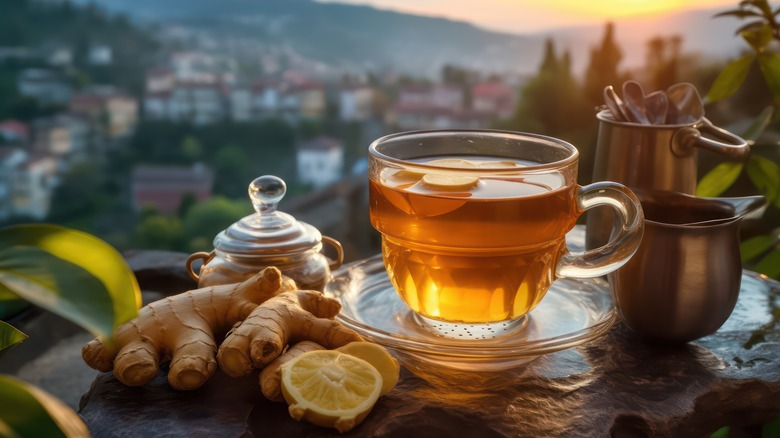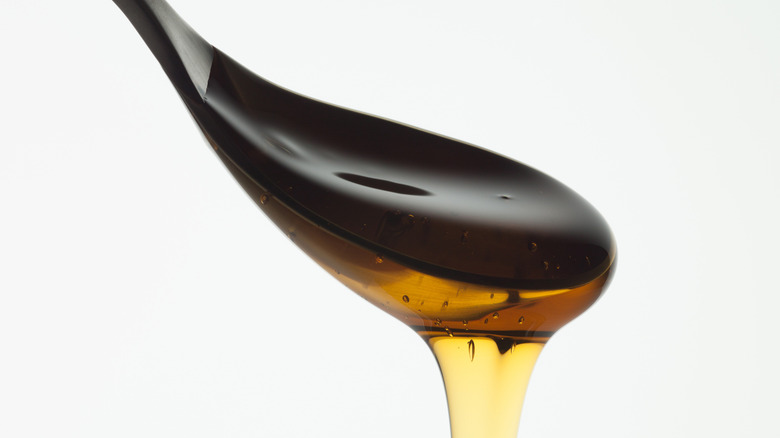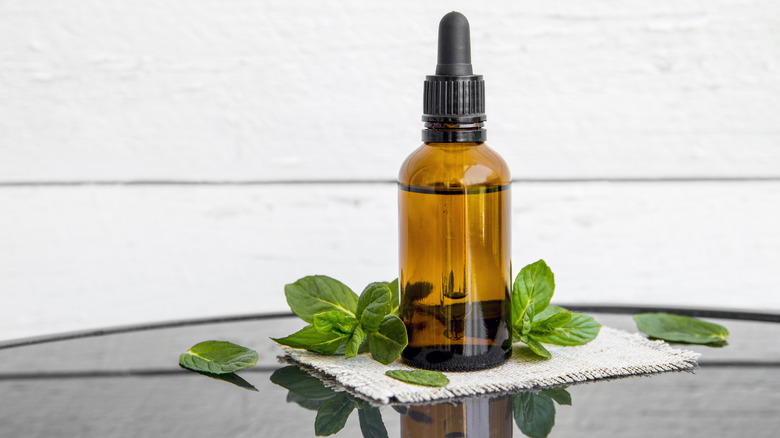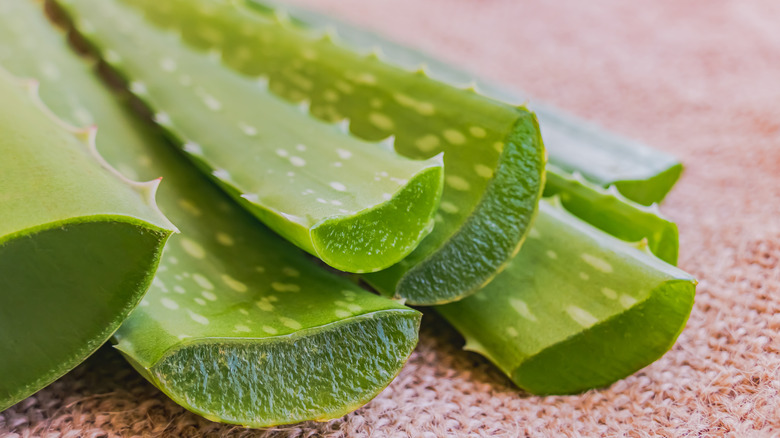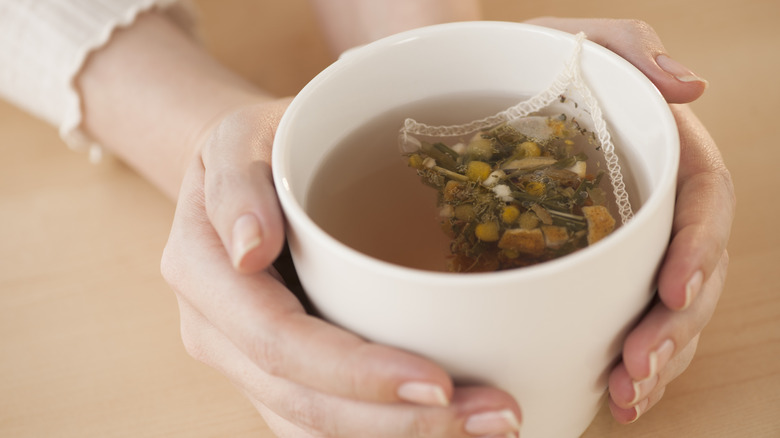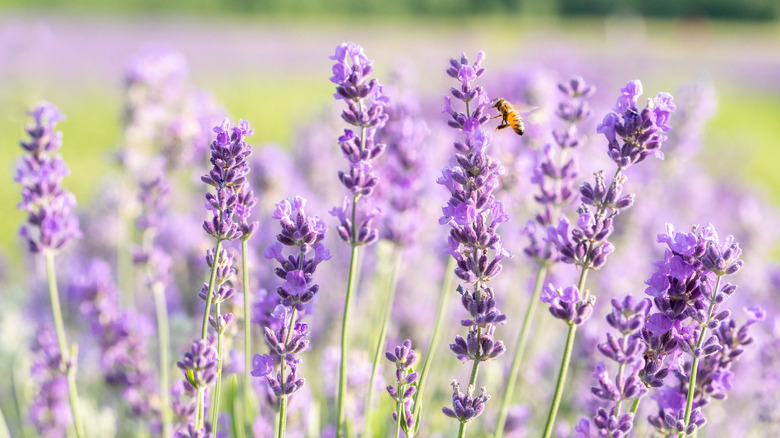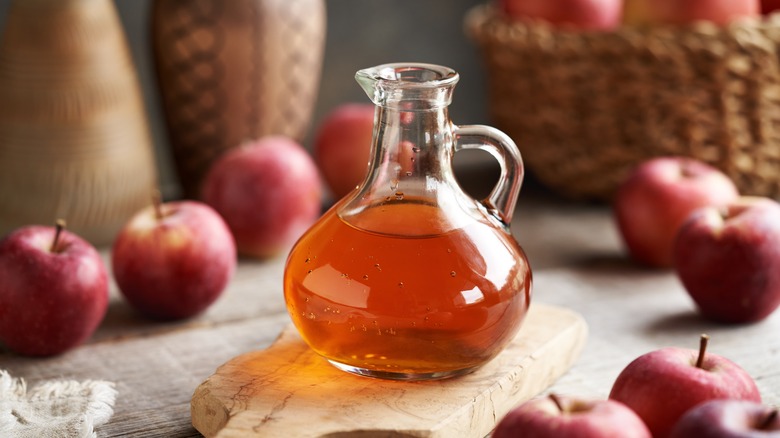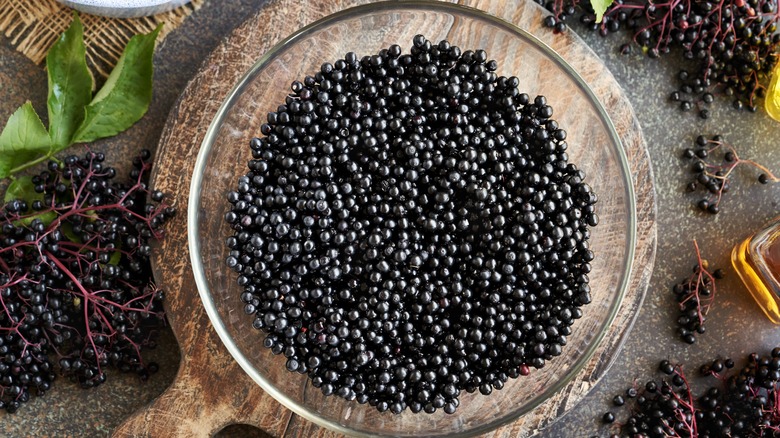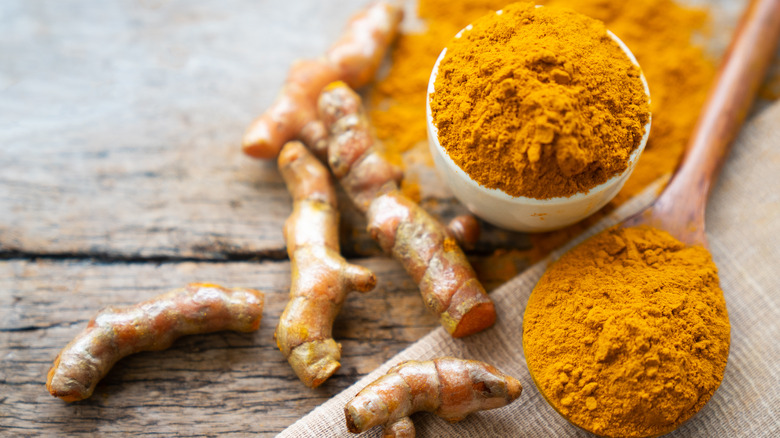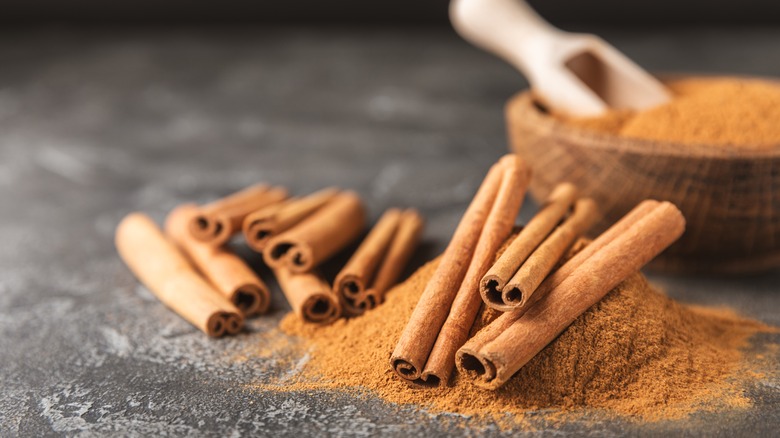12 Natural Remedies That Work According To Doctors
In the age of social media news and misinformation, you can't believe everything you read on the internet. Chugging hot sauce likely won't cure your cold, and putting toothpaste on your pimples won't do much besides dry out your skin. With all the myths and inaccurate health claims circulating these days, it's no surprise that natural remedies often face scrutiny and skepticism. While some people view them as mere placebos or wishful thinking, there's a growing body of evidence that highlights the effectiveness of many natural treatments. Contrary to suspicions, numerous remedies have been validated by scientific research and are endorsed by medical professionals.
In an exclusive interview with Health Digest, functional medicine and longevity physician Dr. Scott Noorda gave his input on natural remedies and how they work. But before we dive in, Dr. Noorda has some advice on when to put a pause on natural options and contact a medical provider: "If your symptoms persist despite using natural remedies for a reasonable amount of time (e.g., several days for minor issues), it's time to consult a doctor." Additionally, if you're dealing with serious symptoms such as severe pain, high fever, difficulty breathing, or chest pain; have major health conditions like diabetes, heart disease, cancer, or chronic illness; or are on prescription medications, it's important to consult with your healthcare provider first, advises Dr. Noorda. Now, let's explore some natural remedies backed by science and doctor-approved.
Ginger root for nausea and digestion
You're likely familiar with ginger root, the common culinary spice famous for its fresh, spicy flavor that it adds to chai tea, curries, gingerbread, and other delicious treats. Besides its culinary uses, ginger root is also valued for its potential health benefits. It has been used in traditional medicine for centuries to help with nausea, digestion, and inflammation. "Ginger has compounds like gingerol and shogaol that help speed up stomach emptying and have anti-nausea effects. It can be particularly helpful for motion sickness and morning sickness," says Dr. Scott Noorda. A 2019 scientific review published in Integrative Medicine Insights analyzed 13 studies on the anti-nausea effects of ginger and found that all of them demonstrated ginger's effectiveness in reducing nausea and vomiting during pregnancy. The review also covered several studies in which ginger was found to help reduce acute nausea in chemotherapy patients.
Ginger also supports digestion and aids in the absorption of nutrients, on top of easing many common digestive complaints like indigestion and an upset stomach. According to gastroenterologist Dr. Jonathan Cohen, "Ginger regulates the flow of digestive juices to make sure food is properly absorbed, improving the function of bile and pancreatic enzymes to help digestion. It can soothe the stomach and reduce discomfort from bloating, nausea, and abdominal distension after meals (via Prevention)." You can incorporate fresh or powdered ginger into meals. Alternatively, Dr. Cohen recommends adding ginger to smoothies or steeping it in hot water to make herbal tea.
Blackstrap molasses for constipation
Blackstrap molasses is a thick, dark syrup that's considered a byproduct of refining sugar cane into processed sugar. It's commonly used as a sweetener or supplement due to its slightly bittersweet flavor and mineral-rich content, which includes iron, calcium, magnesium, potassium, phosphorus, and vitamin B6. It offers many health benefits, including addressing anemia, soothing arthritis, supporting bone and hair health, and easing constipation. Dr. Scott Noorda attributes the effectiveness of blackstrap molasses for relieving constipation to its high magnesium content. "Magnesium can help relax muscles and act as a stool softener," Dr. Noorda says.
Internal medicine specialist Dr. Ashita Gupta told Prevention: "It's especially useful for pregnant women because it's a more natural alternative than chemical laxatives, plus it contains iron and many other essential vitamins and minerals." Dr. Gupta recommends taking 1 tablespoon daily for constipation. Its bitter taste can make it difficult to consume by the spoonful, so consider stirring it into water or your favorite beverage or drizzling it over bread, yogurt, or oatmeal.
Peppermint essential oil for headaches
Headaches can be a real nuisance. They can throw a wrench in our routine, prevent us from completing daily tasks, or keep us from enjoying our favorite activities. The next time you have a nagging headache that just won't go away, think about trying peppermint essential oil. "The menthol in peppermint increases blood flow and, when used topically as an essential oil, has a cooling sensation that can reduce headache symptoms," says Dr. Scott Noorda. Peppermint oil diluted to a 10% solution is a standard health professional recommendation for treating headaches in Germany, as per a 2016 review published in Schmerz (German for "pain").
Dr. Tieraona Low Dog says (via Prevention), "Peppermint essential oil can be applied to the temples to relieve tension headaches. You can make your own by putting five drops of peppermint essential oil in 1 ounce of a carrier oil, such as almond or grapeseed. Shake well and store in a small glass jar. When you feel a headache coming on, massage a few drops of the oil into your temples. Close your eyes and take a few deep breaths. Repeat in 20 to 30 minutes if needed." Dr. Low Dog recommends keeping the oil away from your eyes, as it may cause irritation, and to avoid use with children under the age of 6.
Aloe vera for sunburns
If you don't already have an aloe vera plant, it's time to consider adding one to your plant collection. Aloe vera is a succulent known for its thick, fleshy leaves that contain a gel-like substance. According to Dr. Scott Noorda, "Aloe vera gel has anti-inflammatory, moisturizing, and cooling properties that can help soothe and heal minor burns, including sunburns."
A 2007 scientific review published in Burns suggests that aloe vera is supportive in healing first- to second-degree burns (minor sunburns land in this category). In his YouTube video about natural remedies that work, Dr. Mike explains: "Aloe vera contains chemical compounds known as anthraquinones, which decrease pain and speed up healing."
You can use the straight gel from the living plant by plucking off a leaf, cracking it open, and squeezing the gooey insides out onto your skin. But no worries if you don't have access to a live plant; you can buy aloe vera gel online or at your local pharmacy. Just be sure to look for 100% aloe vera with no additives.
Chamomile tea for insomnia
If you've ever drank sleepytime tea, it likely contained chamomile, the lovely little flower that looks like a small daisy. This herb has a long history of use in traditional medicine for soothing stress, anxiety, insomnia, gastrointestinal disorders, rheumatic pain, and even hemorrhoids. The essential oil is used in cosmetics and aromatherapy, and many different types of herbal preparations of chamomile exist on the market. The most popular way to use chamomile is as a tea ; more than one million cups of chamomile tea are consumed every day, according to a 2011 report published in Molecular Medicine.
Dr. Scott Noorda explains, "Chamomile has mild sedative effects and contains an antioxidant that binds to brain receptors that promote sleepiness and reduce insomnia." A 2017 investigation published in the Journal of Education and Health Promotion revealed that chamomile significantly improved the sleep quality of elderly study participants in nursing homes. Plus, a 2019 Phytotherapy Research meta-analysis of 12 different studies on chamomile found that it effectively improved sleep quality. Due to its sedative qualities, it's best to wait and drink chamomile at night. "Usually the optimal time to drink some chamomile tea is 45-60 minutes before bedtime or during wind down time to help with sleep," sleep medicine physician Dr. Lulu Guo told the Sleep Foundation.
Lavender for anxiety
Lavender seems to be a staple ingredient in nearly every store-bought product, ranging from bath salts and lotions to body wash and laundry detergent, and for good reason. This herb has a long history of use in traditional medicine and aromatherapy. In fact, it was even used in ancient Egypt during the embalming preparations for mummies (per Heathline). Lavender is widely used to address various skin issues like eczema, itching, rashes, and burns, as well as acne, headaches, depression, and insomnia. However, it is perhaps most renowned for its relaxing effects. "Lavender oil has calming and sedative effects that can help reduce anxiety, improve mood, and promote better sleep," shares Dr. Scott Noorda.
A 2019 meta-analysis published in Phytomedicine suggests that lavender aromatherapy, as well as internal use, can dramatically lower anxiety levels. Another Phytomedicine study from 2010 found that lavender pills were just as effective in reducing anxiety as lorazepam, the anti-anxiety prescription drug. According to Dr. Andrew Weil: "For symptoms of anxiety or depression, take one 80 mg soft gel of lavender extract once or twice a day. You can also make lavender tea using an infusion of dried lavender flowers." As always, check with your healthcare professional before adding supplements to your daily routine.
Apple cider vinegar for acid reflux
Apple cider vinegar isn't just any vinegar. It's made from fermented apples, yeast, and sugar, and the fermentation process is thought to be what gives it some health benefits. Be sure to look for raw, unfiltered apple cider vinegar that looks a little cloudy, which indicates the presence of beneficial bacteria and yeast. Dietitian Lindsey Wohlford says these "good" bacteria are known as probiotics, which can help support digestion and a balanced gut microbiome (via MD Anderson Cancer Center). According to Wohlfod, apple cider vinegar also contains acetic acid, potassium, and polyphenols, a type of antioxidant that boosts overall health and wellness.
For all of these reasons, "apple cider vinegar can help balance stomach acid levels and improve digestion," Dr. Scott Noorda says. However, drinking it straight from the bottle isn't ideal. Not only does it taste less-than-pleasant, but it can also be quite intense. Dr. Noorda recommends diluting a tablespoon of apple cider vinegar in water and drinking it before meals to help reduce acid reflux symptoms.
Cranberry juice for urinary tract infections (UTIs)
If you've ever dealt with the discomfort of a urinary tract infection (UTI), you might have been advised to drink cranberry juice. While it may seem like an unusual recommendation, it actually works! A 2023 study published in JAMA explains that cranberry products were shown to reduce UTI risk in several different participant groups: children by 54%, patients with a high risk of UTI after a medical procedure by 53%, and those struggling with reoccurring UTIs by 26%. Dr. Scott Noorda says, "Cranberry juice (opt for unsweetened!) contains compounds that can prevent bacteria from adhering to the walls of the urinary tract, reducing the risk of infections."
If you're concerned about the sugar content of cranberry juice, you're not alone. Urologist Dr. Jennifer Linehan points out that the sugar in the juice might diminish the benefits of the cranberry. She recommends taking cranberry in powder form or a supplement called d-mannose, which is also known to help block bacteria from clinging to bladder walls (per Medical News Today). However, it's important to note that research indicates cranberry juice is more effective for preventing UTIs than treating them (via Mount Sinai). The standard treatment for UTIs is antibiotics. If you suspect you have a UTI, it's crucial to consult a medical professional for proper diagnosis and treatment.
Elderberry for cold and flu
You might have come across elderberry syrup or supplements in the cold medicine aisle. But what exactly is it? Elderberries come from the elder tree (Sambucus nigra), which blooms bunches of tiny white flowers in the spring that eventually turn into bluish-black elderberries in the fall — right in time for cold and flu season! However, if you spot an elderberry tree outdoors, don't try to eat the elderberries raw. It's important to cook them before consumption to reduce the risk of stomach upset.
Elderberry has a long tradition of use and offers many health benefits. It's high in vitamin C and antioxidants, which help boost immunity and overall health. "Elderberry has antiviral properties that can boost the immune system and reduce cold and flu symptoms," according to Dr. Scott Noorda. When speaking about their 2019 study published in the Journal of Functional Foods, Dr. Golnoosh Torabian said: "Our study has shown the common elderberry has a potent direct antiviral effect against the flu virus (via Science Daily)." A 2016 study published in Nutrients revealed that travelers who consumed elderberry before and after getting sick from the common cold experienced a reduction in both the duration and severity of their symptoms. With all this in mind, it's a good idea to stock up on elderberry syrup for the next time you start to feel under the weather.
Tea tree oil for acne
Tea tree essential oil is made by the steam distillation of Australian tea tree leaves. It has been used traditionally for aromatherapy and addressing skin issues like dandruff, eczema, insect bites, lice, and more. "Substances like tea tree oil have been used by communities and cultures for hundreds or thousands of years with good effect and minimal harm," family physician Dr. Simon Hodes told the Cleveland Clinic.
Tea tree oil is also a popular natural remedy to help reduce and prevent acne. Dr. Scott Noorda says tea tree oil works topically because it has strong antibacterial and anti-inflammatory properties. In fact, it works just as well as some over-the-counter topical acne treatments. A 1990 study published in The Medical Journal of Australia found that both 5% tea-tree oil and 5% benzoyl peroxide had a similar effect on acne reduction.
Many people are unaware that tea tree essential oil should be diluted to prevent potential skin irritation and dryness, which could actually worsen acne. If you're into DIY, you can dilute tea tree oil at a 1:12 ratio — for every 1 drop of tea tree, you'll use 12 drops of carrier oil or witch hazel. Dr. Hodes suggests using a carrier oil that supports skin health, such as coconut, jojoba, or argan oil, and performing a skin patch test before applying it more broadly. This test involves applying a small amount of oil mixture to your skin and monitoring it for 48 hours for any signs of irritation.
Turmeric for inflammation
Turmeric is a bright orange root from the Curcuma longa plant in the ginger family. Turmeric is a common culinary spice found in many South Asian cuisines like curries, rice dishes, soups, and the popular golden milk tea. The root gets its vivid golden color from a compound called curcumin. According to Dr. Scott Noorda, "Curcumin is a powerful anti-inflammatory and antioxidant that can help reduce inflammation and pain." Inflammation is your body's natural response to injury or disease, and it can be either acute or chronic. Acute inflammation is typically more obvious, like swelling, while chronic inflammation can be associated with pain, fatigue, fever, rashes, depression, anxiety, gastrointestinal issues, and more.
"Anyone who's trying to manage inflammation could benefit from adding some turmeric to their foods," Dr. Mary-Eve Brown told Johns Hopkins Medicine. She notes that inflammatory conditions can include things like arthritis and other joint disorders, colitis, allergies, infections, and more. "Some research results show that people who have osteoarthritis reported less joint pain when eating turmeric in recipes," Dr. Brown shares. One scientific example is a 2022 study published in JOSMA, which found that curcumin was more effective than a placebo in reducing pain for participants with osteoarthritis. Turmeric can be added to both sweet and savory foods or steeped and brewed as an herbal tea. "You can drink turmeric tea warm or cold, and add lemon and/or honey to change the taste," Dr. Brown says.
Cinnamon for blood sugar control
Cinnamon is a common kitchen spice, often used in cooking and baking for its sweet and warm flavor — cinnamon rolls, anyone? But many people don't know it holds a resume full of health benefits. Cinnamon is rich in antioxidants, has anti-inflammatory properties, and is known to help boost heart health, balance blood sugar, and may even reduce the risk of some cancers and neurodegenerative diseases, per Healthline.
Some scientific studies suggest that cinnamon can be beneficial for those with a prediabetic or type 2 diabetes diagnosis. According to Dr. Scott Noorda, "Cinnamon has been shown to improve insulin sensitivity and lower blood sugar levels, making it a helpful supplement for those managing type 2 diabetes." Functional medicine doctor Menka Gupta told Medical News Today: "Adding cinnamon to the diet can blunt the blood glucose increase and can be [a] beneficial part of a balanced diet for people with prediabetes." Research suggests that the positive effects of cinnamon may be due to its ability to support the gut microbiome. "Cinnamon could improve gut health: Beneficial bacteria like Lactobacillus and Bifidobacterium can enhance gut barrier function, reducing systemic inflammation. Lower inflammation is associated with improved insulin sensitivity," Dr. Gupta says.
Adding cinnamon to your foods can be both delicious and healthy, but it's important to consult with your healthcare professional before starting any daily supplements. "Cinnamon contains coumarin, which can be toxic at high levels," warns Dr. Gupta.

